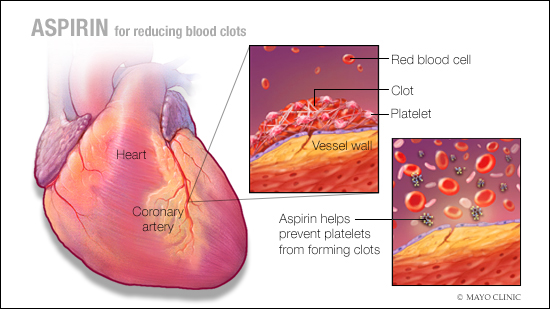 DEAR MAYO CLINIC: I take low-dose aspirin each day to prevent heart trouble, based on my doctor’s recommendation. Should I take enteric-coated aspirin to protect my stomach?
DEAR MAYO CLINIC: I take low-dose aspirin each day to prevent heart trouble, based on my doctor’s recommendation. Should I take enteric-coated aspirin to protect my stomach?
ANSWER: It depends, but you probably don’t need enteric-coated aspirin. Enteric-coated aspirin is designed to resist dissolving and being absorbed in the stomach. As such, enteric-coated aspirin passes into the small intestine, where it’s absorbed into the bloodstream. The purported goal is to prevent stomach ulcers and bleeding that can sometimes occur with aspirin use.
When it comes to preventing a heart attack or stroke, the purpose of taking low-dose aspirin is to help prevent the development of harmful — or deadly — artery-blocking blood clots. However, with enteric-coated aspirin, research indicates that bloodstream absorption may be delayed and reduced, compared to regular aspirin absorption. Regular aspirin is quickly dissolved and absorbed in the stomach. As a result, enteric-coated aspirin may not be as effective as regular aspirin at reducing blood clot risk.
Also, the gastrointestinal benefit of enteric-coated aspirin is minimal to nonexistent. When it comes to rates of ulceration and bleeding, there’s no difference between enteric-coated and regular aspirin. The risk of ulcers and bleeding probably comes from aspirin’s effects in the bloodstream, rather than from where the drug dissolves and is absorbed.
Research isn’t fully settled on every nuance of enteric-coated aspirin versus regular aspirin. Indeed, the most important factor with aspirin successfully preventing cardiovascular problems is regularly taking it at the dose recommended by your health care provider. However, the weight of evidence is on the side of taking aspirin without enteric coating to prevent harmful blood clots. If you can’t find aspirin without an enteric coating, crushing or chewing an enteric-coated aspirin eliminates the effect of the enteric coating. (adapted from Mayo Clinic Health Letter) — Dr. Brian Shapiro, Cardiovascular Disease, Mayo Clinic, Jacksonville, Florida
****************************
Related Articles
- Is taking a daily aspirin really necessary? published 9/17/18
- Mayo Clinic Minute: Aspirin for heart health not headaches published 5/17/18







